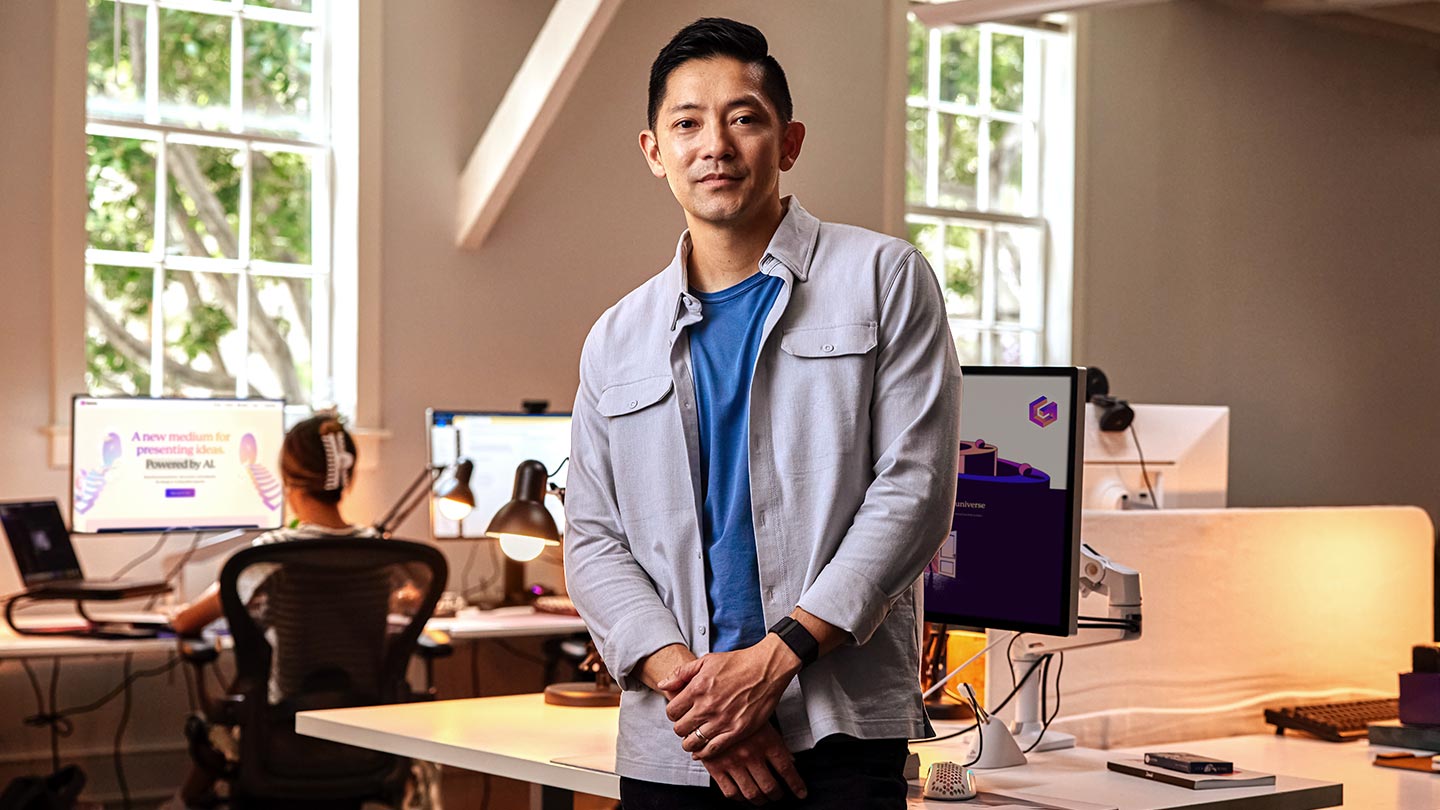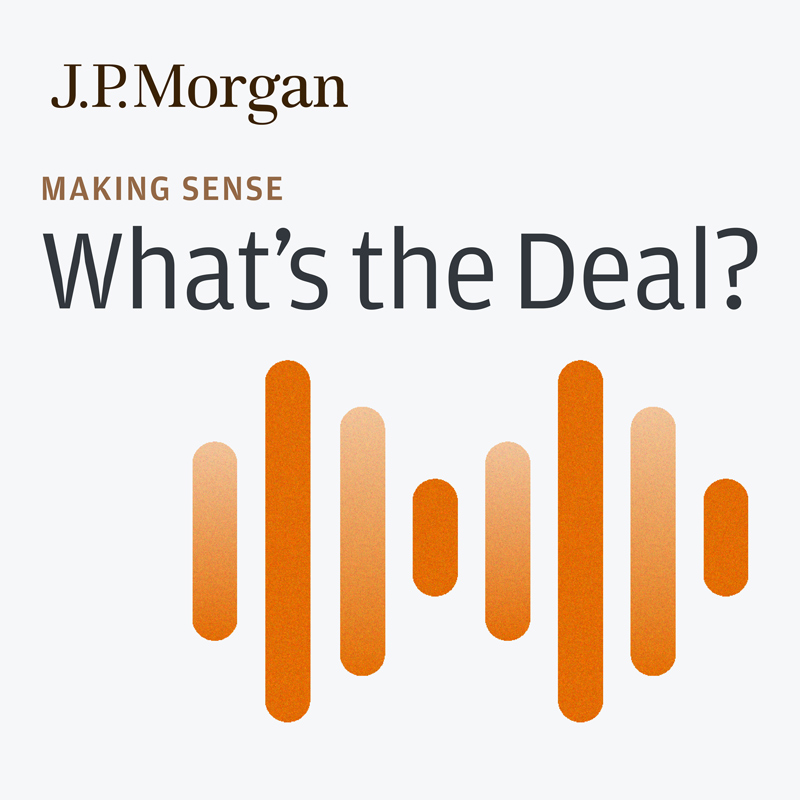For Companies and Institutions
-
Commercial Banking
We provide credit, financing, treasury and payment solutions to help your business succeed. We also offer best-in-class commercial real estate services for investors and developers.
-
Global Corporate Banking
We help clients achieve their long-term strategic goals through financing, liquidity, payments, risk management and investment banking solutions.
-
Investment Banking
Providing investment banking solutions, including M&A, capital raising and risk management, for a broad range of corporations, institutions and governments.
-
Institutional Investing
We support the entire investment cycle with market-leading research, asset management, analytics, execution, and investor services.
-
Payments
Your partner for commerce, receivables, cross-currency, working capital, blockchain, liquidity and more.
Key Links
For Individuals
-
Wealth Management
With J.P. Morgan Wealth Management, you can invest on your own or work with an advisor to design a personalized investment strategy. We have opportunities for every investor.
-
Private Bank
A uniquely elevated private banking experience shaped around you.
Explore a variety of insights.
Key Links
Insights by Topic
Explore a variety of insights organized by different topics.
Key Links
Insights by Type
Explore a variety of insights organized by different types of content and media.
Key Links
We aim to be the most respected financial services firm in the world, serving corporations and individuals in more than 100 countries.
Key Links
- Insights
- J.P. Morgan Podcasts
- What's the Deal?
- “It’s not just innovation, it’s impact”: How AI is revolutionizing healthcare

“It’s not just innovation, it’s impact”: How AI is revolutionizing healthcare
[Music]
Nick Richitt: Welcome to J.P. Morgan's Making Sense where we explore innovation, capital, and the forces impacting the banking industry. I'm Nick Richitt, a banker here at J.P. Morgan, and I'm excited about today's conversation because we're diving into how artificial intelligence is revolutionizing healthcare. Joining me is Michael Gao, the co-founder and CEO of SmarterDx, now president of Smarter Technologies, a company using AI to understand clinical reasoning, the why behind a clinician's decisions to create more accurate patient records. Michael, welcome. It's great to have you.
Michael Gao: Thanks, Nick. It's great being here.
Nick Richitt: So Michael, before we get into the meat of the conversation, can you give our listeners a little bit of the backstory, the origin story on yourself and SmarterDx?
Michael Gao: Yeah, absolutely. So I'm a physician by background and was a hospitalist at New York Presbyterian, but also led applied AI for the health system. And in that world, really understood revenue cycle to be, first, kind of the process of generating a correct invoice for the care that was delivered. And then second was jumping through the 257 plus or minus hoops to actually get paid on that invoice. And given both my technical background and clinical background, realized that we could use that underlying clinical data to make sure that the patient story was accurately represented, and that was the formation for SmarterDx. And then with Smarter Technologies as a whole, this is a combination of four companies. Of course you have SmarterDx and Pieces, which is a physician note generation platform focused on the acute care space. And then also Thoughtful, which is an agent AI platform and Access, which is a leading scaled delivery platform for revenue cycle operations. And what's really great is that the thesis of Smarter Technologies actually reflects what I was seeing when I was a physician in a hospital, which is between the DX and Pieces side, it's about getting that clinical story, that first invoice correct. And then between the agentic and scaled delivery side, it's about jumping through the 257 hoops in a efficient and low cost way to get paid on the care that was delivered.
Nick Richitt: And those assets came together pretty rapidly just year to date. AI's been a buzzword for a number of years now in healthcare. It feels like almost a decade. But it does feel like we're finally hitting a point where it's delivering real practical value, the hard dollar ROI as it were. So maybe let's start there, Michael. What's driving this AI acceleration and AI adoption finally across healthcare right now?
Michael Gao: Yeah, Nick. Just to extend on that point, sometimes I wonder if, for people in healthcare, if they feel like software in general has delivered-
Nick Richitt: Fair.
Michael Gao: ... much value up until the most recent point. And I think the reason why is that until very recently, software has largely been a recreation of manual workflows. So as an example, pre-computing, you had physical patient charts instead of EMR records. Then some person would read through the chart and compile a set of medical codes. This was done because you couldn't very well FedEx a patient binder to an insurance company and tell them to figure out how much to pay you. And so that translation to medical codes then the claim, and and so on and so forth. And the EMR of course replaced the patient chart, and revenue cycle software for a really long time was now you have a digital work list instead of a physical work list. But a person was still going through the entire patient chart to try to abstract and figure out what medical codes should be there and kind of how to represent that sort of patient story. And so I think the arc of software and healthcare has been digitization of processes, but not the reduction of the cognitive work needed to do revenue cycle correctly. And for the first time in the past couple years, what we're seeing on the AI side is the ability to reduce that cognitive workload and act sort of upon things that historically have required human intelligence, whether that's understanding the patient journey or whether that's sort of navigating a payer portal to actually get something submitted.
Nick Richitt: Right. So once upon a time, we codified those processes. We digitized them, as you said. 30 years later, I guess that was the biggest productivity step we had in the software cycle. And I'm using air quotes, nobody can see me. And here we are talking about artificial intelligence, and, and look, I think that tracks with what we're seeing on the financial side too. Investors strategics are shifting focus from experimental AI to practical clinically integrated solutions, like what Smarter Technologies is doing. So tell us more about how Smarter Technologies AI works in practice. How does it understand clinical reasoning? What kind of impact are you seeing?
Michael Gao: Yeah, absolutely. On the clinical reasoning side, there's really no easy path. We built out a team of PhD data scientists, are fine tuning our own models, coming up with new paradigms to do this. And it's able to take in things like labs, medications, orders, vitals, flow sheets, and so on and so forth. And almost like a clinician, deduce the things that were treated during that hospitalization. And by making sure that all of those things are represented, hospitals are seeing a 30 to 50 point sort of basis point lift to their margin, which, you know, your average hospital has a 2% operating margin. So that can be quite a significant lift. And then on the Access and Thoughtful side, you know, this is a combination of sort of agentic workflows, backstopped by human experts. And so historically, one of the challenges with trying to do automation within healthcare settings is healthcare is super complicated and there's always exceptions or things that don't go quite right. And because of our ability to have delivery at scale and the technology that we have, we can do both the automation and the sort of backstopping of those exceptions and areas where things are different than expected. And so on that side, what we're seeing is a significantly reduced, effectively cost to collect, because hospitals and providers, are not needing to sort of have just thousands of people as the only solution to go through the hoops of collection and anywhere from a 20 to 50% boost in efficiency on that side. And I think when you take it together, really there's an opportunity to take, for the, for the hospital or the provider, a business with 2% operating margins and really start to reshape what that business can look like and help them reallocate many of those dollars from the administrative side of the world to the patient care side of the world.
Nick Richitt: Well, I think we've all seen the charts, right? The, uh, the growth in administrative expenses, the lack of growth in physician productivity. And we're seeing health systems increasingly prioritize solutions that reduce cognitive load rather than add another layer of tech. From a capital markets perspective, those companies, one's improving operational efficiency and accuracy, are attracting the most investor attention. So let's zoom out to the broader market. Healthcare AI is moved from niche seed round innovation to mainstream investment. In fact, we, we have an official exit. We're seeing a few trends emerging now. One, increased consolidation. Larger incumbents are acquiring AI startups to build integrated data platforms. Venture funding moderation, I think fewer but larger rounds. Emphasizing proven business models, there's some early winners. And then cross-sector partnerships, with payers, pharma, sometimes corporate venture arms collaborating on AI applications. So Michael, how are you experiencing this shift? Is consolidation changing the way you think about growth or partnerships?
Michael Gao: Absolutely. You know, I think that from a hospital's perspective, there are so many different areas where you can apply AI, and what you don't want to do is contract with 1057 different vendors, each vendor for each area. And I think our strategy is to have combine the distribution of a skilled player and]the ability to deliver of a skilled player and I think key innovations along the spectrum of RCM. And so with Pieces, the key innovation is a deep understanding of physician workflow and how to integrate AI into the physician workflow, they get 90 plus percent physician adoption, which I say this as well myself, is incredibly hard because it's like herding cats. With Dx of course, it was that clinical intelligence and the ability to translate clinical data into revenue cycle impact. With Thoughtful, it was kind of agentic workflows and the ability to take that next step in automation and then, you know, Access is that backbone and and scale delivery layer. And so I think that absent this trend to consolidation both on the capital side and on the buyer side, you might have seen these four companies run as kind of independent companies for longer. But what we're hearing from the market is, hey, we want one platform to go to or a, a small number of platforms to go to that can offer the spread of technologies and solutions that we need. And so I think it's, it's driven us to really try to become that platform in a short period of time, and hence the velocity that you've seen this year.
Nick Richitt: Yeah. It reminds me of that book Thomas Friedman wrote, I think about a decade ago, called the Age of Acceleration. It does feel like we're seeing that convergence of different data flows, technology and trends. And I think from our vantage point, it, it really does feel like healthcare A- AI is entering what we sometimes call the integration phase. I don't know if that's also in line with what Gartner would call the slope of enlightenment. But after years of experimentation, now we're seeing investors reward companies that can embed AI within existing clinical and operational systems, not just stand apart from them. I think we're also seeing capital diversification. We're seeing private equity firms backing startups, strategics doing acquihires again, VCs buying hospitals, and even health systems creating venture arms to invest in AI that improves their own operations. So what's your perspective on this? Do you guys see opportunity in partnering with larger organizations or payers as AI becomes more embedded in the healthcare infrastructure?
Michael Gao: We definitely see, um, lots of opportunity in partnering with these large health systems and and large provider systems. I think one of the themes that's unique about AI relative to software is software is fundamentally deterministic, which is to say you click a button, then you go to the next screen and then you kind of act in this way. And, and it provides, you know, as we kind of talked about, kind of workflow guardrails. And AI, in a sense, is kind of unpredictable and non deterministic in that you might type a prompt, you know, just in thinking of our own personal experiences into ChatGPT, but you can't fully predict what the output of that kind of will be. And so when it comes to implementing AI in health systems, I think what the industry is seeing is that the players that are successful are the ones that are sort of deeply partnered with their customers, and it's a iterative process where you're helping your customer understand how to almost manage AI outputs and how to derive new workflows to accrue that value. And you're also taking that understanding and using that to drive how you build models in the first place. And so I think it's, it's very much an, as you alluded to, an embedding of AI within kind of clinical and operational workflows, and you really can't separate the technology and product from the person using it anymore.
Nick Richitt: Alright. And that's a key point. I, I think the access to data and capital is- isn't, isn't just about financing. At J.P. Morgan, we're helping clients navigate these inflection points, whether it's structuring growth capital, preparing for strategic partnerships, or evaluating M&A opportunities. And for many AI firms, the goal isn't just to raise funding, it's to find the right partner to bring innovation to scale. So let's look ahead. AI and healthcare holds massive potential, but there's still barriers. Data quality, data silos, regulatory frameworks, and clinical adoption. What do you see as the biggest challenges to scaling AI responsibly in healthcare?
Michael Gao: I think a lot of scaling AI responsibly is going to involve making sure that the decisions made by AI are both controlled and transparent. So meaning that the sort of decision stays in the hands of the provider or the expert, and transparent in that there's a way to audit how those decisions came to be and and how the AI came to understand whatever it understood. And, and these two kind of go hand in hand because I don't think that given that literal patient lives are at stake with AI in healthcare, I don't think we're at a point where we can sort of relinquish control of healthcare decisions to black blocks, not understandable algorithms. And so of course the opposite of that is having control and transparency into the decisions that are made, right?
Nick Richitt: And we're seeing capital increasingly aligned with responsible innovation. Investors wanna fund AI that enhances care rather than replaces it. And here's the obligatory fast forward question, Michael. Let's jump five years. Where do you think we'll see the biggest impact from healthcare AI?
Michael Gao: Well, in a self-serving way, I would say that the biggest impact will be a shift of dollars from the administration of healthcare to the parts of healthcare that add value to real people's lives. The treatment, you know, and the R&D which is, you know, obviously what healthcare is all about. And outside of that, I'm really excited for just the acceleration of that R&D sort of process in general. And I think there's a lot of really neat stuff on sort of drug discovery, new molecules, and new treatments that are more and more informed by big data approaches. So if I had to pick within revenue cycle, it's the reallocation of dollars. But if I had to stay away from revenue cycle and not talk anything about Smarter Technologies, it would be kind of a new wave of innovation and better treatments for patients.
Nick Richitt: I think we're moving towards a model where AI amplifies human experience and I think where we, we see something akin to augmented intelligence too, where technology handles the repetitive work so the clinicians can focus on patient care. It's not just innovation, it's impact. So Michael, thank you for joining us. It's been an insightful look at how Smarter Technologies is redefining what intelligent healthcare really means. From where we sit at J.P. Morgan, the momentum around healthcare AI is only growing, but the winners will be those who combine trust, transparency, and thoughtful capital strategy. Michael, thank you for joining us. I'm Nick Richitt, thanks for listening and we'll see you next time.
[Music]
Voiceover: Thanks for listening to ‘What's the Deal?’ If you've enjoyed this conversation, we hope you'll review, rate, and subscribe to J.P. Morgan's Making Sense to stay on top of the latest industry news and trends, available on Apple Podcasts, Spotify, and YouTube.
To stay ahead of the curve, sign up for J.P. Morgan's In Context newsletter, packed full of market views and expert insights straight to you. To subscribe, just visit jpmorgan.com/in-context.
This material was prepared by the investment banking group of J.P. Morgan Securities LLC and not the firm's research department. It is for informational purposes only, and is not intended as an offer or solicitation for the purchase, sale, or tender of any financial instrument.
© 2025 JPMorgan Chase & Company. All rights reserved.
[End of episode]
In this episode, Nick Richitt, global co-head of Healthcare Services at J.P. Morgan, sits down with Michael Gao, co-founder of Smarter DX and president of Smarter Technologies, to explore how AI is revolutionizing healthcare. Together, they dive into the journey from digitization to true innovation, discussing how AI is transforming clinical reasoning, improving patient records and driving operational efficiency for hospitals and health systems. They also address the challenges of scaling AI responsibly, emphasizing the importance of collaboration and control. What is the future of intelligent healthcare, and how will it amplify the human experience?
This podcast was recorded on October 30, 2025.
More from What's the Deal?
J.P. Morgan investment bankers discuss the trends driving deals around the globe.
More from Making Sense
What’s the Deal? is a part of the Making Sense podcast, which delivers insights across Investment Banking, Markets and Research. In each conversation, the firm’s leaders dive into the latest market moves and key developments that impact our complex global economy.
This material was prepared by certain personnel of JPMorgan Chase & Co. and its affiliates and subsidiaries worldwide and not the firm’s research department. It is for informational purposes only, is not intended as an offer or solicitation for the purchase, sale or tender of any financial instrument and does not constitute a commitment, undertaking, offer or solicitation by any JPMorgan Chase entity to extend or arrange credit or provide any other products or services to any person or entity.
© 2025 JPMorgan Chase & Company. All rights reserved.
Related insights

Technology
How vibe coding can reshape startup economics
Nov 12, 2025
Using AI to code applications changes what startups can build and how quickly. Understand the financial implications for founders and investors navigating this shift.

0:30 - Technology
How AI is transforming presentations: Gamma’s story
Jan 28, 2025
Discover how co-founder and CEO of Gamma Grant Lee is using AI to transform business presentations, with support from J.P. Morgan’s startup expertise.

Technology
Championing the Industrial Revolution
Apr 15, 2024
Our technology and AI experts explore the factors underpinning industrial transformation—and the role J.P. Morgan has played through each of the revolutions.

Technology
Artificial intelligence: What are the investment opportunities?
Oct 12, 2023
Artificial intelligence is projected to significantly impact the economy, starting in the near future. Learn more here.

Technology
The future of AI in the federal market
Nov 03, 2022
Tech companies are leading the way in artificial intelligence and machine learning. Here’s a look at what types of research and development the government is looking for—and how it’s funded.

Technology
How AI Can Reduce the Time and Cost of Drug Discovery
Jun 29, 2020
Artificial intelligence helps streamline labor-intensive design and new drug development—leading to lower costs and reduced time to market.
You're now leaving J.P. Morgan
J.P. Morgan’s website and/or mobile terms, privacy and security policies don’t apply to the site or app you're about to visit. Please review its terms, privacy and security policies to see how they apply to you. J.P. Morgan isn’t responsible for (and doesn’t provide) any products, services or content at this third-party site or app, except for products and services that explicitly carry the J.P. Morgan name.
